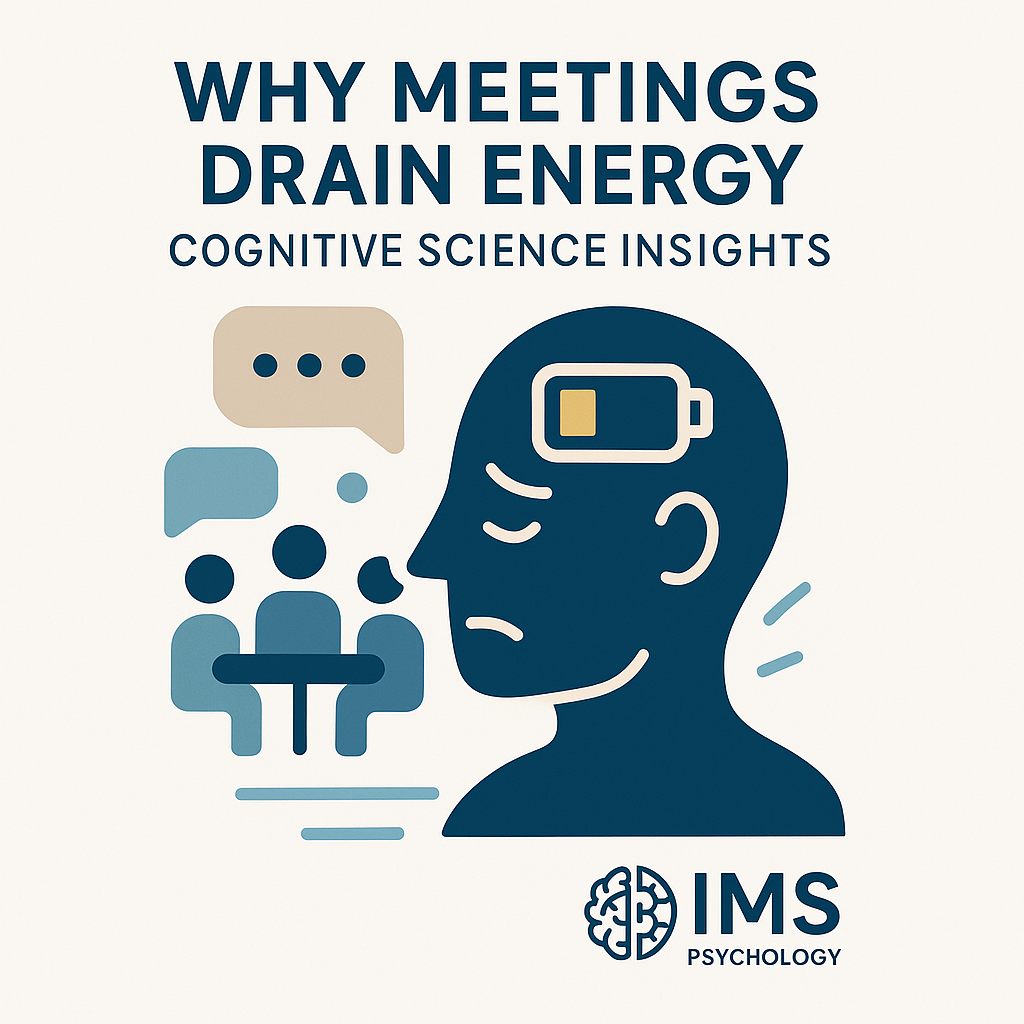
Why Meetings Drain Energy: Cognitive Science Insights
Share
Why Meetings Drain Energy: Cognitive Science Insights
Learn why meetings drain energy from a cognitive psychology perspective. Discover science-backed reasons and how to make meetings more productive.
Introduction: The Hidden Cost of Meetings
Back-to-back meetings. Long video calls. Brain fog by 2 p.m. If this sounds familiar, you’re not alone. While meetings are meant to promote collaboration, they often leave employees feeling drained, distracted, and behind on actual work.
Why do meetings — even short ones — deplete mental energy so quickly? The answer lies in cognitive science. Understanding how our brains handle attention, communication, and decision-making reveals why meetings can be so taxing — and what we can do to change that.
The Brain During Meetings: What’s Happening?
1. Cognitive Load Overload
Meetings require active listening, memory retention, multitasking, and real-time analysis — all at once. This places high demand on working memory, a limited system that helps us hold and process information temporarily.
When too many stimuli compete (slides, faces, messages, spoken ideas), cognitive overload kicks in, leading to mental fatigue and reduced comprehension.
2. Context Switching & Task Fragmentation
Every meeting interrupts a flow state. Jumping from deep work to a meeting — then back again — forces the brain to switch contexts, burning cognitive resources each time.
Research shows that it can take up to 23 minutes to fully re-focus after a task switch. In a day full of meetings, this toll adds up quickly.
3. Zoom Fatigue (Virtual Meeting Drain)
-
Eye contact in video calls feels unnatural and intense, increasing alertness and fatigue.
-
Self-view causes self-monitoring, triggering stress responses.
-
Lack of body language forces the brain to work harder to interpret social cues.
Together, these create what Stanford researchers call Zoom fatigue — a uniquely draining experience for the digital age.
4. Social Evaluation Stress
Meetings often involve subtle performance pressure. Whether speaking up, being evaluated, or managing impressions, social vigilance activates the amygdala — the brain’s emotional threat detector.
Even low-grade social stress consumes energy and elevates cortisol, leaving participants mentally tired post-meeting.
Why Some Meetings Feel Worse Than Others
-
Lack of purpose or structure → leads to mental wandering and frustration.
-
Passive participation → increases disengagement and boredom.
-
Too many participants → dilutes relevance and reduces psychological safety.
-
Over-scheduling → doesn’t allow the brain time to reset or reflect.
The Psychological Toll of Meeting Culture
-
Decision fatigue: Constant micro-decisions in meetings erode clarity for real work.
-
Decreased autonomy: Feeling locked into meetings lowers motivation.
-
Invisible burnout: Exhaustion without visible outputs leads to internalized stress and frustration.
How to Make Meetings Less Draining
✅ Before the Meeting
-
Ask: Is this meeting necessary?
-
Set clear objectives (inform, decide, brainstorm?).
-
Share an agenda in advance to reduce real-time overload.
✅ During the Meeting
-
Start with a psychological check-in or grounding moment.
-
Limit length: the brain’s natural attention span is ~25–40 minutes.
-
Use visuals or summaries to reduce verbal load.
-
Assign roles (facilitator, notetaker) to reduce ambiguity.
✅ After the Meeting
-
Offer a short reflection window before jumping to the next task.
-
Send a simple recap to reduce reliance on memory.
-
Review meeting volume weekly — are you making space for deep work?
The Future of Meetings: Brain-Friendly Design
-
Asynchronous tools (e.g., Loom, Notion) reduce real-time drain.
-
Silent meetings: Participants read and comment in writing, then align quickly.
-
Meeting-free blocks or days: Allow for creative recovery and deep focus.
-
Shorter stand-ups, not status overload: Prioritize clarity and brevity.
Conclusion: Meetings Should Serve the Mind, Not Drain It
Meetings aren’t the problem — poor meeting culture is. When designed with cognitive science in mind, meetings can be productive, energizing, and even meaningful. But without structure or intention, they become energy leaks in disguise.
If you're ready to rethink how your team works, our Workplace Focus & Flow Toolkits at IMS Psychology offers science-backed tools to reduce cognitive overload, improve focus, and create brain-friendly systems.
written by,
Martin Rekowski (28.09.2025)
-
External link suggestion: Stanford Study on Zoom Fatigue
- https://news.stanford.edu/stories/2021/02/four-causes-zoom-fatigue-solutions